"American Sniper" - Dishonest, Racist Film Spawns Death Threats against Arabs and Muslims
- Eastwood's 'American Sniper' Is One Big Historically Dishonest Action Flick - Alex von Tunzelmann (The Guardian)
- "American Sniper" spawns death threats against Arabs and Muslims - Rania Khalek (The Electronic Intifada)
- 7 Big Lies 'American Sniper' Is Telling America - Zaid Jilani (AlterNet)
Is American Sniper historically accurate?
Clint Eastwood's simplistic film about one of the deadliest snipers in US history piles on Bush-era propaganda and sharp-shoots the facts
By Alex von Tunzelmann
January 20, 2015
The Guardian (UK)
American Sniper (2014)
Director: Clint Eastwood
Entertainment grade: D+
History grade: D-
Chris Kyle, known as "Legend", was a US Navy Seal who served in Iraq in the early 2000s. He is considered the deadliest sniper in US history, with a recorded 160 confirmed kills out of 255 probable kills. He later served as a bodyguard for Sarah Palin.
Decisions
The opening sequence of the movie, also featured in a trailer, depicts Chris Kyle (Bradley Cooper) with his sights trained on a street in Iraq ahead of a marine convoy. A woman comes out of a house and hands a Russian-made RKG-3 anti-tank grenade to a young boy. She sends the child running towards the convoy. Should Kyle shoot? It's a tense moment, and the same incident the real Kyle used to open his memoir, American Sniper, on which this film is based. But it has been heightened for the screen. In real life, there was no child, only an adult woman -the film makes her extra-evil by having her send a child to his death. The real Kyle wrote that she had a Chinese grenade. It may have been a smaller hand grenade rather than an anti-tank weapon, which is bigger and easier to see. It was, he wrote, "the first time in Iraq - and the only time - I killed anyone other than a male combatant." At least, as far as he knew.
Bad guys
Director Clint Eastwood - last seen at the Republican national convention in 2012, telling off an empty chair for invading Afghanistan - reduces everything here to primary colours and simple shapes. Kyle joins the Seals after he watches the 1998 US embassy bombings on TV (in real life, these had nothing to do with his decision). When he gets to the frontline, all Iraqis resisting the US occupation are unquestionably identified as AQI (al-Qaida in Iraq), making them legitimate targets. In the script they're referred to, without irony, as "savages", as they are throughout Kyle's book.
In case you don't believe they're savages, the main Iraqi characters - who have virtually no lines- are clearly very bad guys. There is a mostly fictional sniper named Mustafa (Sammy Sheik), a former Olympic marksman, who is mentioned in one paragraph of Kyle's book but in the film becomes his sharp-shooting, marine-murdering nemesis. In real life, Kyle wrote of Mustafa: "I never saw him, but other snipers later killed an Iraqi sniper we think was him." In the film, Kyle and Mustafa battle to the death.
Then there's a fictional terrorist called the Butcher (Mido Hamada), who wears a long black coat and attacks small children with electric drills. The Butcher may be loosely based on Ismail Hafidh al-Lami, known as Abu Deraa, blamed for thousands of deaths in the mid-2000s. The main point is that he's horrible. In fact, everyone Kyle kills is horrible. The war is a lot easier to support when no Americans ever make a mistake and everyone who opposes them is obviously horrible. You're either with us or against us. We're spreading freedom and democracy with guns and drones. God bless America.
Good guys
Every kill Kyle makes, even with shots taken after split-second decisions, is 100% righteous and saves American lives. The skull logo of Marvel's murderous vigilante the Punisher is on his vest and his armoured vehicle, yet nobody asks whether that sort of symbolism is going to help win Iraqi hearts and minds. He is a true patriotic American, with a whacking great tattoo of a Jerusalem cross on his arm. That bit is true: "I had it put in in red, for blood," he wrote. "I hated the damn savages I'd been fighting. I always will. They've taken so much from me."
Kyle suffers after his tours of duty, but only, he says, because he wanted to kill more bad guys to save more marines. He develops a thousand-yard stare, and attacks his own dog at a barbecue. The message of American Sniper is that Kyle is the real victim of the war. The Iraqis he shot deserved it, because - as it has established to its own satisfaction - they were savages. As for non-savage Iraqis who may have reasonable grounds to complain about what happened to their country following the invasion, they must be in some other movie.
Sources
This film alters Kyle's book significantly, but the reliability of his account may also be open to question. In 2014, wrestler-turned-politician Jesse Ventura won over $1.8m (£1.2m) in damages from Kyle's estate after a jury decided he had been defamed. Kyle claimed he had punched Ventura in a bar after Ventura said navy Seals "deserved to lose some" for their actions in Iraq. Ventura said he had never even met Kyle. In a separate case, Kyle told a writer he had shot and killed two armed men who attempted to carjack him in Dallas. Reporters were unable to confirm this with county sheriffs and medical examiners, all of whom insisted no such incident had ever taken place. Kyle further claimed that he and another sniper had sat on top of the Superdome in New Orleans during the aftermath of Hurricane Katrina, and killed 30 armed civilians he thought were making trouble. Again, this story could not be confirmed by any of the relevant authorities.
One investigating journalist wrote in the New Yorker that these tales "portray Kyle as if he really were the Punisher, dispensing justice by his own rules. It was possible to see these stories as evidence of vainglory; it was also possible to see them as attempts by a struggling man to maintain an invincible persona." Maybe some of these brags were true, and maybe they weren't. A lot of this film certainly isn't - and all the complicated questions it leaves out would have made it a much more interesting story than the Bush-era propaganda it shovels in.
Verdict
Clint Eastwood's movie slathers myths on top of Legend's own legends. Audiences would be well advised to take American Sniper's version of the war in Iraq with a very, very large pinch of salt.
[Alex von Tunzelmann is a historian and writer. She has published two books: Indian Summer: The Secret History of the End of an Empire (2007) and Red Heat: Conspiracy, Murder and the Cold War in the Caribbean (2011).]
"American Sniper" spawns death threats against Arabs and Muslims
By Rania Khalek
January 22, 2015
The Electronic Intifada
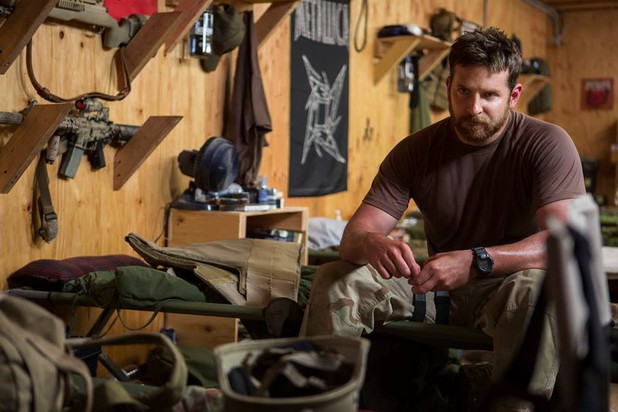
Atrocity porn: Clint Eastwood's latest movie glorifies military aggression.
credit: Facebook page for American Sniper
Following the release of the film American Sniper in theaters across the US, the American-Arab Anti-Discrimination Committee (ADC) has warned of a "significant rise in violent hate rhetoric targeting the Arab and Muslim-American communities."
The ADC believes the threats "are directly linked to the negative media coverage and hateful propaganda launched against the Arab and Muslim communities following the attacks on the Charlie Hedbo offices in France" earlier this month. But the civil rights organization notes that racist threats have intensified in the wake of American Sniper, with moviegoers taking to social media to express their desire to murder Arabs and Muslims after leaving the theater.
Having both watched the movie and read the book on which it is based, I am not the least bit surprised by the incitement it has spawned. American Sniper is brilliant propaganda that valorizes American military aggression while delivering Hollywood's most racist depiction of Arabs in recent memory, effectively legitimizing America's ongoing bombing campaigns across the Middle East.
Unrepentant mass killer
American Sniper, directed by Clint Eastwood, is based on the autobiography of Navy SEAL Chris Kyle, reputedly the deadliest sniper in American history.
Replete with hatred, bigotry and unrepentant bloodlust, Kyle's book boasts of killing 160 Iraqi "savages" during his four deployments in Iraq following the illegal US invasion and occupation in 2003.
"Savage, despicable evil. That's what we were fighting in Iraq," Kyle writes in his book.
"I only wish I had killed more," he writes, adding, "I loved what I did . It was fun. I had the time of my life."
"They hated us because we weren't Muslim. They wanted to kill us, even though we just booted out their dictator, because we practiced a different religion than they did," adds Kyle, who goes on to confess, "I don't shoot people with Korans - I'd like to, but I don't." In Kyle's mind, all Iraqis who resisted the invading US soldiers were irrationally violent religious fanatics.
In stark contrast, Hollywood sanitizes Kyle, humanizing him as a complex, likable and anguished hero.
Hateful
Following the movie's debut in select theaters on Christmas Day, author and journalist Max Blumenthal and I were deluged with death and rape threats for tweeting our disgust with Hollywood's glorification of a mass killer and exposing the racism and lies espoused by Kyle. Although Kyle's most ardent supporters claim to hate ISIS and al-Qaeda, they often call on these terrorist groups to behead critics of US military aggression.
The movie has since broken box office records, grossing $105 million during its nationwide opening and garnered accolades from across the political spectrum (Vice President Joe Biden said he wept at the Washington, DC premier). In addition, the movie scored six Academy Award nominations.
Frustrated by the glorification and whitewash of a racist mass killer, I posted passages from Kyle's book on Twitter, highlighting his hateful and homicidal statements and drew attention to the anti-Arab and anti-Muslim threats the movie was inspiring, all of which I compiled into a Storify that went viral.
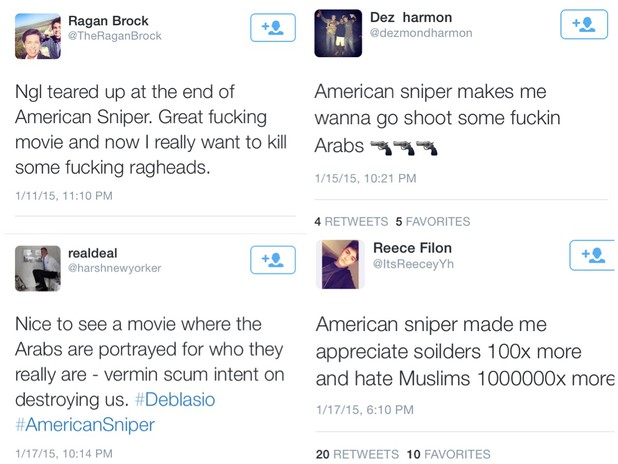
Image by Rania Khalek
The reaction to the movie has since snowballed into a partisan bickering match, with celebrities chiming in.
Actor Seth Rogen compared American Sniper to Stolz der Nation (Nation's Pride), a fictitious Nazi propaganda film about a glorified Nazi sniper that appears at the end of the Quentin Tarantino movie Inglorious Basterds (the Nazi sniper is shown mowing down American and British soldiers with great efficiency and apparent moral superiority). Documentary maker Michael Moore also stirred controversy when he tweeted that snipers "aren't heroes," though he later clarified he was not referring to American Sniper, which he liked. Nevertheless, a who's who of rightwing celebrities, pundits, politicians and worshippers of US military aggression have whipped up an ultra-nationalist frenzy, firing back against the movie's critics.
Meanwhile, growing criticism of American Sniper appears to be damaging its chances of winning at the Oscars, with Academy members expressing concern that the film glorifies a "sociopath."
Racist atrocity porn
While the canonization of Kyle on the big screen is appalling, the movie's whitewash of the US destruction of Iraq and its racist portrayal of Arabs has proven to be far more dangerous.
The US destruction of Iraq left an estimated one million Iraqis dead, 4.5 million displaced, five million orphaned, some two million widowed and birth defects and cancer rates significantly worse than those seen in the aftermath of the atomic bombing of Japan at the end of the Second World War. The US war on Iraq also fueled the rise of ISIS. This immeasurable suffering is completely erased from the narrative presented in American Sniper.
In the opening scene of the film a conflicted Chris Kyle (played by Bradley Cooper) is perched on a rooftop with an Iraqi mother and child in the crosshairs of his sniper scope. He watches the mother give the child a grenade to throw at a US marine convoy. He reluctantly seeks permission to shoot.
Suddenly the screen cuts to Kyle as a child hunting with his father in Texas. Another scene shows him at church. Next he's at the dinner table.
"There are three types of people in this world: sheep, wolves and sheepdogs," says Kyle's father. "Now, some people prefer to believe that evil doesn't exist in the world . those are the sheep. And then you got predators who use violence to prey on the weak. They're the wolves. And then there are those who have been blessed with the gift of aggression, and the overpowering need to protect the flock. These men are the rare breed that live to confront the wolf. They are the sheepdog."
For the rest of the movie Kyle is the sheepdog, the protector, the hero. And Iraqis are the evil wolves he must put down to protect the lives of his fellow "sheepdogs."
Next we see Kyle as an adult. We watch him fall in love, get married and join the SEALs. Then the Twin Towers fall and he is deployed to Iraq, a narrative that leaves the poorly informed with the impression that Iraq was involved in the 11 September 2001 attacks, the very lie that the Iraq war was predicated on. This false narrative is reaffirmed when al-Qaeda appears in Iraq on Kyle's first tour in 2003, a revisionist history that conflates indigenous armed resistance to a foreign occupier with a terrorist group that attacked the United States. In a country where 43 percent of Americans still believe that Iraq was connected to the 11 September 2001 attacks, perpetuating this falsehood, even if unintentional, is reckless.
Eventually, we return to the scene in the movie's opening. Kyle shoots the child to save the Marine convoy. The mother runs towards the felled child, collects the grenade and prepares to launch it in the direction of the soldiers. Kyle shoots the woman dead at mid-launch. The grenade explodes before it reaches the soldiers.
"There was a kid who barely had any hair on his balls, his mother gives him a grenade and sends him out there to kill Marines," says an agonized Kyle. "That was evil like I'd never seen before."
This black and white, good versus evil theme continues throughout the movie's entirety. US soldiers are humanized. They have names and families, fiancées and children. And they return home with deep physical and psychological wounds, whereas the local Arab population, including the women and children, are depicted as terrorists. The only time Arab women and children are innocent victims is when they are being brutalized by scary Arab men, but even they are nameless figures.
Marlow Stern at The Daily Beast provides a cogent summary of the movie's depiction of Arab characters:
The "savages" consist of [Abu Musab] al-Zarqawi, who's introduced via the infamous clip of him decapitating [American radio-tower repairman] Nick Berg; his No. 2, "The Butcher," who brutally executes an informant's young son by drilling his head with a power tool, and stores people's heads on shelves; and Mustafa, a Syrian Olympic sharpshooter who videotapes his kills and hawks bootlegs of them on the street. Mustafa is, like all classic villains, dressed in black, doesn't utter in a word, and is single-minded in his pursuit of Kyle - he has a poster of Kyle's bounty, $180,000, on his wall, and spends his spare time spinning an armor-piercing bullet on a table.
In the end, it wasn't Iraqi "savages" that killed Kyle. A fellow soldier suffering from post-traumatic stress disorder shot Kyle dead at a Texas gun range in 2013, a fact the film glosses over before cutting to footage from Kyle's real-life funeral. Some may have even left the theater with the impression that Kyle was killed in Iraq.
Where are the moderates?
As the threats against Arab and Muslim Americans and critics of American Sniper escalate in their ferocity, one is left wondering: where are the American moderates? Why haven't the movie's director, producers and actors condemned the violent extremism their film is inciting?

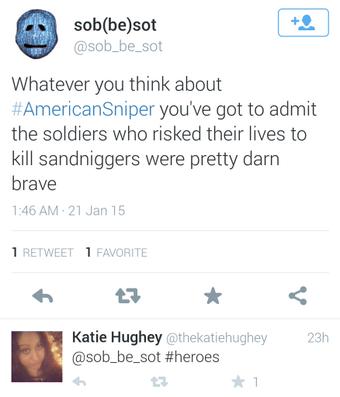
(Jim DeFelice, one of the co-authors of the book American Sniper, condemned the threats of violence unleashed after I implored him to in a debate on Uprising Radio.)
Under the threatening circumstances, the American-Arab Anti-Discrimination Committee is encouraging Arab, Muslim, South Asian and Sikh-American communities to be on alert and report any hate crimes to the authorities.
"If you are placed in physical danger because of your ethnicity, religion or national origin: Call the police (dial 911 in most communities), and/or click here to contact your local FBI office. It is the FBI's job to investigate hate-motivated crimes and specific threats of violence. You can also report a hate crime to the FBI online using this form," says the ADC advisory.
"If you feel you have been a victim of a hate crime, of if any individual or place of worship needs any assistance with any of the above, including dealing with law enforcement, please contact the ADC Pro-Bono Legal Department at 202-244-2990 or legal AT adc DOT org."
[Rania Khalek is an independent journalist reporting on the underclass and marginalized. For more of her work check out her website Dispatches from the Underclass and follow her on Twitter @RaniaKhalek.]
7 Big Lies 'American Sniper' Is Telling America
There is a backlash against the film's misleading take on sniper Chris Kyle's character.
By Zaid Jilani
January 21, 2015
AlterNet
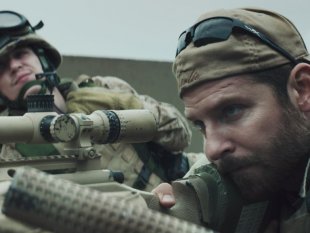
The film American Sniper, based on the story of the late Navy Seal Chris Kyle, is a box office hit, setting records for an R-rated film released in January. Yet the film, the autobiography of the same name, and the reputation of Chris Kyle are all built on a set of half-truths, myths and outright lies that Hollywood didn't see fit to clear up.
Here are seven lies about Chris Kyle and the story that director Clint Eastwood is telling:
1. The Film Suggests the Iraq War Was In Response To 9/11: One way to get audiences to unambiguously support Kyle's actions in the film is to believe he's there to avenge the 9/11 terrorist attacks. The movie cuts from Kyle watching footage of the attacks to him serving in Iraq, implying there is some link between the two.
2. The Film Invents a Terrorist Sniper Who Works For Multiple Opposing Factions: Kyle's primary antagonist in the film is a sniper named Mustafa. Mustafa is mentioned in a single paragraph in Kyle's book, but the movie blows him up into an ever-present figure and Syrian Olympic medal winner who fights for both Sunni insurgents in Fallujah and the Shia Madhi army.
3. The Film Portrays Chris Kyle as Tormented By His Actions: Multiple scenes in the movie portray Kyle as haunted by his service. One of the film's earliest reviews praised it for showing the "emotional torment of so many military men and women." But that torment is completely absent from the book the film is based on. In the book, Kyle refers to everyone he fought as "savage, despicable" evil. He writes, "I only wish I had killed more." He also writes, "I loved what I did. I still do. If circumstances were different - if my family didn't need me - I'd be back in a heartbeat. I'm not lying or exaggerating to say it was fun. I had the time of my life being a SEAL." On an appearance on Conan O'Brien's show he laughs about accidentally shooting an Iraqi insurgent. He once told a military investigator that he doesn't "shoot people with Korans. I'd like to, but I don't."
4. The Real Chris Kyle Made Up A Story About Killing Dozens of People In Post-Katrina New Orleans: Kyle claimed that he killed 30 people in the chaos of New Orleans after Hurricane Katrina, a story Louisiana writer Jarvis DeBerry calls "preposterous." It shows the sort of mentality post-war Kyle had, but the claim doesn't appear in the film.
5. The Real Chris Kyle Fabricated A Story About Killing Two Men Who Tried To Carjack Him In Texas: Kyle told numerous people a story about killing two alleged carjackers in Texas. Reporters tried repeatedly to verify this claim, but no evidence of it exists.
6. Chris Kyle Was Successfully Sued For Lying About the Former Governor of Minnesota: Kyle alleged that former Minnesota Governor Jesse Ventura defamed Navy SEALs and got into a fight with him at a local bar. Ventura successfully sued Kyle for the passage in his book, and a jury awarded him $1.845 million.
7. Chris Kyle's Family Claimed He Donated His Book Proceeds To Veterans' Charity, But He Kept Most Of The Profits: The National Review debunks the claim that all proceeds of his book went to veterans' charities. Around 2 percent - $52,000 - went to the charities while the Kyles pocketed $3 million.
Although the movie is an initial box office hit, there is a growing backlash against its simplistic portrayal of the war and misleading take on Kyle's character. This backlash has reportedly spread among members of the Academy of Motion Picture of Arts and Sciences, which could threaten the film's shot at racking up Oscars.
[Zaid Jilani is an AlterNet contributing writer.]

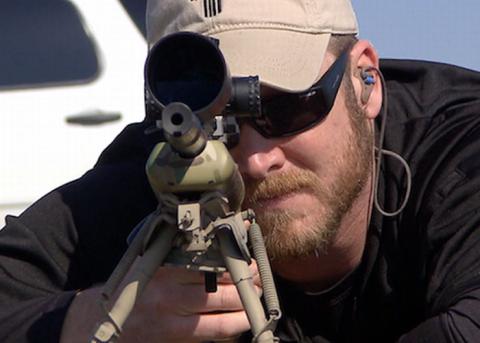
Spread the word